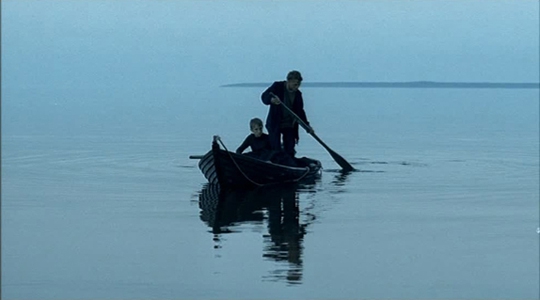The Return: Movie Review
12/31/2003
In the spirit of The Decalogue and The Sacrifice — unsettling, spiritually challenging works of eastern European mystical-realist cinema — first-time director Andrei Zvyagintsev’s The Return is a harrowing, elusively biblical account of a grim road trip involving a long-absent father and his two estranged sons.
Echoes of Abraham and Isaac, the Gospel parables about fathers and pairs of sons, and the Second Coming run through a stark tale of an inscrutable, harsh stranger whose unexpected reappearance in the lives of his two sons is as unexplained as his disappearance so many years earlier. Our first glimpse of the nameless father (Vladimir Garin) lying in bed overtly recalls Mantegna’s Lamentation Over the Dead Christ — yet this man is anything but Christlike in his treatment of his newfound sons.
Teenaged Vanya (Ivan Dobronravov) and young Andrey (Vladimir Garin) are being raised by their mother (Natalya Vdovina) when their unknown father appears from nowhere, and their mother’s unreadable response to her husband’s return gives them no clue how to respond. Vanya, hungry for a role model of manhood and professing to have dim memories of his father, takes to this bullying drifter, but suspicious Andrey defiantly crosses him at every turn.
So dark is the film’s anonymous father-figure that critics have compared him to Robert Mitchum’s phony preacher in Night of the Hunter, a dreadful father-figure whose eerie pursuit of two young siblings is somewhat reminiscent of The Return’s fishing trip. Yet revisiting Night of the Hunter after watching The Return, I was struck by the stark difference between the perversion of fatherhood in The Return and the counterfeit paternalism of Night of the Hunter — the difference being that a perversion is a corruption of something real, whereas a counterfeit is merely a simulation with no reality.
Mitchum in Night of the Hunter merely caricatures parental affection; it’s phony and meaningless to the core. By contrast, the father in The Return is perhaps even more unsettling precisely because his paternal concern for his sons cannot be entirely dismissed. The mystery of fatherhood — the image of the Father — is warped and muddied in him, but it is not wholly absent, as it is in Powell.
The Return is about Vanya and Andrey, not their father; more precisely, it is about how the boys respond to and deal with the crisis of their father’s appearance and behavior. Yet the brothers’ crisis is precisely a filial crisis, and the fatherhood of their anonymous bane is at the very heart of the film. If, instead of a father, the film had posited an abusive neighbor or old family friend mistreating the boys on a fishing trip, it would be a completely different film. "I could love you if you were different!" Andrey shouts desperately at one point. His desperation is inseparable from intractable fact of his tormentor’s fatherhood.
How is the mystery of fatherhood present, if distorted, in this dark figure? To begin with, he is at least partly motivated by a real if misdirected desire for his sons’ good. "If you, being evil, know how to give good gifts to your sons…" Jesus said to fallible human fathers. This father may not quite know how to give good things to his sons, but it’s clear that he wants them to have them and is making some effort to instill in them, e.g., self-sufficiency, fortitude, discipline, respect for elders.
For another thing, he is willing to push them and even see them suffer for the sake of their own growth. In this respect his behavior, while not that of a good father, it is unmistakably a distortion of fatherhood specifically in its distinctness from motherhood.
In the first act we see Vanya and Andrey’s mother seeking to shelter and comfort them (though she is curiously unable to shield them from the one thing she should perhaps be most concerned about, her long-absent husband); their father, by contrast, insists that they stand on their own two feet, even if they stumble and fall — a contrast that can be seen (though not to the disturbing extremes seen here) any weekend at the playground as parents of both sexes watch their children.
The clearest revelation of the character’s fatherhood comes toward the end as he rises for a moment to real selflessness, to something that might be true love. Whether this moment redeems him, or to what extent, is among the film’s many ambiguities; Zvyagintsev invites reflection and debate rather than providing clear-cut answers.
Beautifully shot and acted, haunting, and arguably a bit too retiscent in the end, The Return is one of the most haunting, thought-provoking films of the year.
Steven D. Greydanus
www. decentfilms.com
